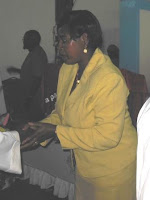First, a brief summary of
the “reformation.” Martin Luther was a monk who studied and
taught theology. He wanted to be a good Christian, which at the time
meant a good Catholic. He never wanted to leave the Catholic Church
but, from his study of the Bible, he thought the church was mistaken
in some of its teachings and sought to correct the error. Catholics
believe the when we die, good people go straight to heaven, bad to
hell, and most everyone goes to purgatory – a place in between
where they wait to become good enough for heaven. Prayers and masses
for the dead can speed up that process. In Luther's time, the church
taught that good works on earth and those done by others on our
behalf could also help. Good works often involved giving money to
the church. This was a time of major cathedral building which was
very expensive. In 1516 the pope offered the sale of indulgences to
help fund the construction of cathedral. Indulgences were
certificates bought to get souls out of purgatory.
Luther wrote a
scholarly paper entitled, "Disputation
of Martin Luther on the Power and Efficacy of Indulgences"
asking for clarification and correction of theological teachings that
were not bibilically based. (He may or may not have ever posted this
document, which is better know as the 95 theses, on the door of the
church in Whittenberg.) The result of his paper and its dessimination
was a split with the church (in time) as Luther was ex-communicated,
or thrown out of the church. The protestors became protestants.
Luthers followers eventually became Lutherans – the first of many
protestants.
(Note: Luther
presented a theological challenge leading to a split. Previously,
“from 1378 to 1417, several men simultaneously claimed to be the
true pope.
Driven by politics rather than any theological disagreement, the
schism was ended by the Council of Constance (1414–1418).”
https://en.wikipedia.org/wiki/Western_Schism)
Luther's challenge and
split became widely known because the printing press had recently
been invented. Copies of the 95 theses were printed in 1518 and were
widely circulated. The printing press also greatly aided Luther's
work as he translated the Bible into German (and others translated it
into other languages).
Nowadays, we acknowledge
that Luther was a product of his times. He was, for example, vocally
anti-semitic – maybe even more than those around him. Hitler used
this part of his teaching to justify his actions during World War II.
Still, Luther's main theses are as important and clear today as they
were 500 years ago: people are saved by grace alone (not good works),
that we must trust in faith alone, and the Bible is the only
yardstick by which we measure all teachings and actions. Words of
hope. Teachings of inclusion.
Other practices became
common place because of Luther: the mass or liturgy in the language
of the people, Bibles translated into the languages of the people,
other teaching materials, such as the large and small catechisms,
written and used (in the people's languages), the belief that people
could go directly to God in prayer without the intermediary of a
priest, priests (later called pastors) who were/are permitted to
marry, etc.
So, it is little
surprise that Lutherans worldwide, and especially in Germany, are
commemorating the 500th
anniversary of the reformation (or the start of it...). Lutherans
in Germany are celebrating the decade of the reformation from 2008 to
2017. “Exhibitions, concerts, church
services, festivals and theatre productions will highlight the
importance of the Reformation and the role Martin Luther played in
the places he lived and worked." Each year has a theme.
(www.luther-in-thueringen.com/en/the-luther-decade.html.
Luther can also now be purchased as a small action figure!
The Lutheran World
Federation (LWF) is sponsoring a project to get women to tell their
stories – about the past reformation and the ongoing one. See
https://www.lutheranworld.org/content/resource-women-move-wittenberg-windhoek-toolkit
for more information.
Many tourists are visiting
Wittenberg and other sites that were important in Luther's life.
Lots of restoration and renovation has/is happening. Did you know
that Wittenberg is in what was formerly known as Eastern Germany and
was for many years "behind the iron curtain"?


 I started thinking
about the reformation not only because of the Sunday we use to
remember it but because of President Ndanga-Toué's visit to Europe.
As the newly elected president of the EEL-RCA the Lutheran World
Federation invited him and other new church leaders to
meetings/seminars in Geneva. Part of this program included visits to
some sites in Germany. Churches and organizations worldwide are
planting 500 trees to commorate the 500th
anniversary of the reformation. The Evangelical Lutheran Church –
Central African Republic has sponsored tree number 293 in
Luthergarten in Wittenberg. Here are some pictures of President
Ndanga-Toué planting and watering the tree along with the
certificate he received. (I heard the story in Garoua Boulai as the
president was headed back to Bouar, CAR. He agreed that I could help
spread the word about his trip and their tree.)
I started thinking
about the reformation not only because of the Sunday we use to
remember it but because of President Ndanga-Toué's visit to Europe.
As the newly elected president of the EEL-RCA the Lutheran World
Federation invited him and other new church leaders to
meetings/seminars in Geneva. Part of this program included visits to
some sites in Germany. Churches and organizations worldwide are
planting 500 trees to commorate the 500th
anniversary of the reformation. The Evangelical Lutheran Church –
Central African Republic has sponsored tree number 293 in
Luthergarten in Wittenberg. Here are some pictures of President
Ndanga-Toué planting and watering the tree along with the
certificate he received. (I heard the story in Garoua Boulai as the
president was headed back to Bouar, CAR. He agreed that I could help
spread the word about his trip and their tree.)
President Ndanga-Toué
stayed in Germany after the LWF event to meet with EEL-RCA's partner
OLM (the German Lutheran Church). He said he got to see even more
sites important in Luther's life and work.
Reformation work still
continues. Human arrogance and error tends to distort beliefs as
they are turned into “religion” and institutionalized. We need
to continue to go to the Bible as we work to correct all errors –
even Luther's.
Happy 500th
anniversary! (almost)
Update:
I am in Yaoundé to apply for a new passport and am taking advantage
of the time to buy supplies for myself and others. My new screen
door in Garoua Boulai is made and installed. I am adapting to my
borrowed computer (and have installed programs and updated everything
I could think of). Life is going back to normal, whatever that is.
The security situation in
CAR is still difficult, in fact, worse in Bangui. Travel on the
roads is a challenge although it is better between Garoua Boulai and
Bouar if travelers go with the UN military escort. Elections have be
re-rescheduled for December and January (first and second rounds).
However, peace and security need to be much more firmly established
for them to be successful.
Plans are moving ahead for
Pope Francis' visit to Bangui in November. Maybe his presence will
add weight to the peace work being done by Central African religions
leaders – Catholic, Protestant, and Muslim.










































